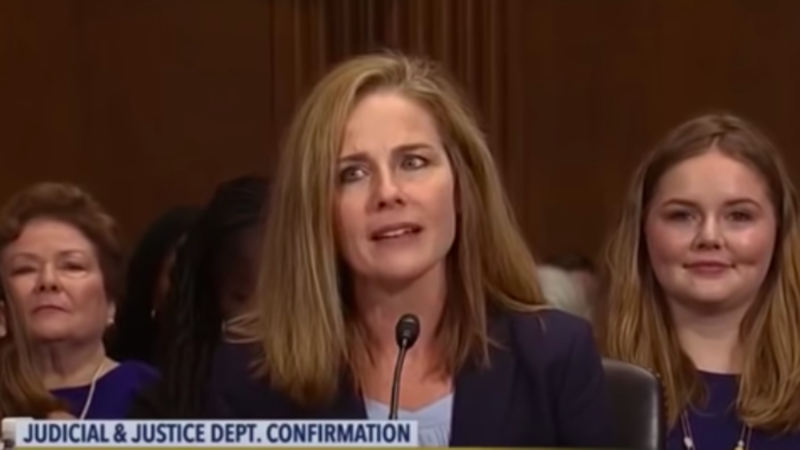It's Official: Trump Nominates Judge Amy Coney Barrett to the Supreme Court
If confirmed, she would cement a strong 6-3 conservative majority.

President Donald Trump on Saturday announced the nomination of Amy Coney Barrett to fill the Supreme Court seat previously occupied by the late Ruth Bader Ginsburg, setting the stage for a heated confirmation battle as Republicans seek to cement a 6-3 conservative majority.
Barrett, currently a federal judge for the U.S. Court of Appeals for the Seventh Circuit, first achieved national attention during her 2017 confirmation hearing for that role. In reference to Barrett's Catholic faith, Sen. Dianne Feinstein (D–Calif.) remarked to the judge that "the dogma lives loudly within you," which was heavily criticized as an example of Democratic hostility toward religious liberty.
Barrett's pro-life outlook will likely be the subject of scrutiny during her upcoming confirmation hearing. It's worth noting, however, that even Ginsburg criticized Roe v. Wade, the landmark abortion rights case, as a decision that reached too far.
The partisan nature of Barrett's nomination is also sure to be a subject of intense debate. Senate Democrats have lamented Republicans' willingness to move forward with a Supreme Court nomination during an election year after declining to consider former President Barack Obama's 2016 nominee, Merrick Garland, following the death of Justice Antonin Scalia.
"I want you to use my words against me," Sen. Lindsey Graham (R–S.C.) said during a 2016 Senate hearing on the subject of the Supreme Court vacancy. "If there's a Republican president in 2016 and a vacancy occurs in the last year of the first term, you can say Lindsey Graham said: Let's let the next president, whoever it might be, make that nomination. And you could use my words against me and you'd be absolutely right."
Sen. Chuck Grassley (R–Iowa) issued similar comments in July: "If I were chairman of the committee and this vacancy occurred, I would not have a hearing on it because that's what I promised the people in 2016," he said. In a statement following Ginsburg's death, Grassley reversed course, explaining that the Senate should in fact vote on the nominee. "The circumstances are different in 2020, where the American people elected a Republican President and Senate in 2016 and expanded the Republican Senate majority in 2018," the statement reads.
Sens. Lisa Murkowski (R–Alaska) and Susan Collins (R–Maine) are the only Republicans who announced their intention to not vote on a nominee before the presidential election, which still leaves Senate Republicans with enough votes to confirm Barrett should they decide to do so.
Some Senate Democrats have threatened to retaliate by packing the courts with additional justices in the event the Senate and White House go blue in the 2020 general election, though Democratic presidential nominee Joe Biden has said he would not support such a move as it would erode any veneer of judicial impartiality. Ruth Bader Ginsburg was similarly skeptical about packing the court.
Barrett's judicial portfolio at this point is somewhat scant, as her appointment to the Seventh Circuit came after a career as an academic at George Washington University Law School and Notre Dame Law School. Thus far, the judge's record is a mixed bag when it comes to criminal cases. Two of her opinions are somewhat encouraging: one in which she concluded that the Second Amendment does not allow a blanket prohibition on gun ownership for those with felony records, and another in which she gutted a qualified immunity defense used by a detective who allegedly framed someone for murder.
The Supreme Court has continuously shied away from the opportunity to reevaluate qualified immunity, the legal doctrine that makes it considerably more difficult to hold public officials—namely police officers—accountable when they violate your rights. After the high court recently declined to hear a spate of qualified immunity cases, Associate Justice Clarence Thomas was the lone judge to push back. If Barrett is confirmed, perhaps he will have some company.


Show Comments (460)